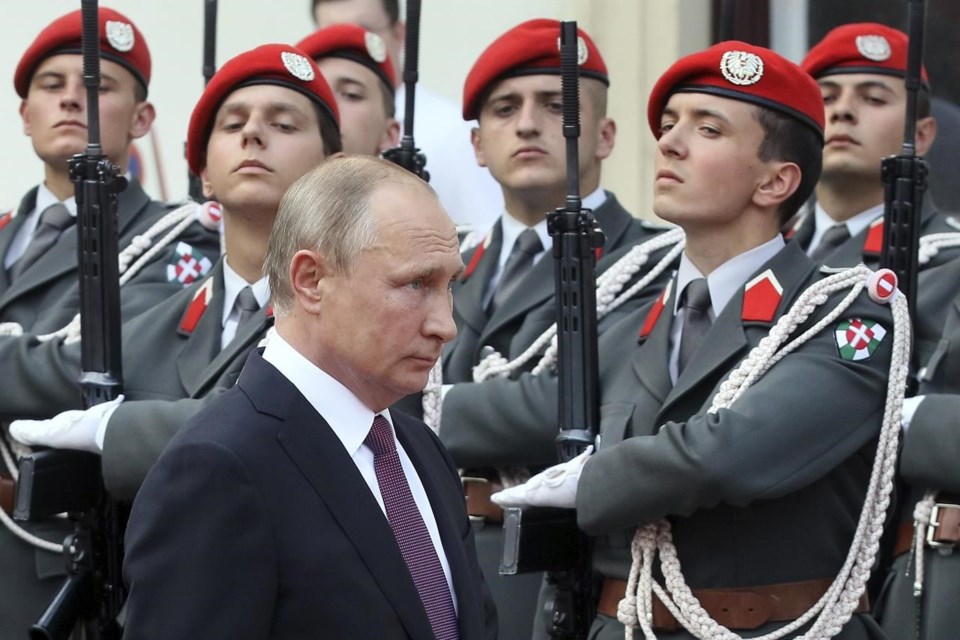VIENNA (AP) — Austria has come under heavy criticism for granting visas that will allow sanctioned Russian lawmakers to attend a Vienna meeting of the Organization for Security and Cooperation in Europe.
The issue highlights the delicate balancing act the European country has engaged in while trying to maintain its longstanding position of military neutrality during the war in Ukraine. The Austrian government has condemned Russia’s invasion of Ukraine almost a year ago but also stressed the need to maintain diplomatic relations with Moscow.
Austria hosts several U.N. agencies and international organizations such as the OSCE, which was established during the Cold War as a forum for dialogue between East and West. Russia is one of the 57 nations in North America, Europe and Asia that participate in the Vienna-based organization.
Moscow plans to send delegates to the Feb. 23-24 meeting of the OSCE's parliamentary assembly, including 15 Russian lawmakers who are under European Union sanctions. Among them are Deputy Duma Chairman Pyotr Tolstoy and fellow parliament member Leonid Slutsky.
In a letter to Austria's chancellor, foreign minister and other officials, 81 OSCE delegates from 20 countries, including France, Canada, Britain, Poland and Ukraine, called upon the Austrian government to prohibit the participation of the sanctioned Russians.
“It is important to remember that Russian parliamentarians are an integral part of the power system and complicit in the crimes Russia commits every day in Ukraine,” read the letter, which was seen by The Associated Press. “They have no place in an institution tasked with promoting sincere dialogue and opposition to the war.”
The U.S. delegates to the Parliamentary Assembly were not among the letter's signatories. U.S. Ambassador to the OSCE Michael Carpenter told reporters Friday that the Russian delegates “are not people who deserve to be able to travel to Western countries.” However, Carpenter added that it was “up to the Austrian government to determine whether they are going to grant visas or not.”
Austrian officials haven’t commented on the letter. On Feb. 5, Foreign Minister Alexander Schallenberg defended Austria’s decision to allow the sanctioned Russians to enter the country, arguing it was important to keep channels of communication with Moscow open despite the “brutal Russian attack against Ukraine.”
The Austrian Foreign Ministry also insisted that as host to the OSCE headquarters in Vienna, it is legally obliged to grant visas to representatives of participating nations who want to take part in meetings there.
Austria, which became a European Union member in 1995, has criticized Moscow and joined the sanctions the EU imposed against Russia over the invasion of Ukraine. But unlike Finland and Sweden, which decided to abandon their non-aligned stances in May by applying to join NATO, Austria remains committed to the military neutrality it adopted in 1955.
The Austrian government has sent humanitarian aid to Ukraine but no weapons. Chancellor Karl Nehammer became the first and so far only EU leader to meet Russian President Vladimir Putin face-to-face after the war started. Nehammer traveled to Moscow in April 2022 in a fruitless attempt to persuade the Russian leader to end the invasion.
Support remains strong for Austrian neutrality among the public and political establishment.
“I believe that Austrian neutrality can still play a positive role today,” saysid Ralph Janik, an expert in international law and researcher at the Sigmund Freud private university in Vienna. “The alternative would be to join NATO, but every single Austrian politician is very well aware that this is not supported by the majority of the Austrian public.”
Austria, which was annexed by Nazi Germany in the run-up to World War II, declared neutrality after the war under pressure from Western allies and the Soviet Union. It sought a role as a mediator between East and West and developed ties with Moscow during and after the Cold War.
In 1968, Austria became the first Western European country to import gas from the Soviet Union, and its dependence on Russian energy increased in the following decades. Before the Russian invasion of Ukraine, 80% of Austria’s natural gas came from Russia. It has since reduced the share to just over 20% by turning to Norwegian gas, according to Austria’s regulator for electricity and gas.
The Austrian banking system is also closely connected to Russia. Austria’s second-largest bank, the Raiffeisenbank International, earned more than half of its profits in 2022 from Russia. The bank has come under intense pressure for continuing its business in Russia despite Moscow’s war against Ukraine, and is currently evaluating strategic options, including an exit from Russia.
Vienna is also known to be a playground for spies, including from Russia, due to its lenient espionage laws. Despite its initial reluctance, Austria has expelled eight Russian diplomats who are believed to have been engaged in spying since the start of the Russian war against Ukraine.
While there are no signs of a shift away from Austrian neutrality, some have called for the policy to be reassessed following the Ukraine war.
Werner Fasslabend, a former Austrian defense minister from the conservative People’s Party, is among the few prominent voices arguing in favor of the country renouncing neutrality and joining NATO. With the end of Cold War and Austria’s accession to the EU, Austrian neutrality has “lost its function,” said Fasslabend, the director of the Austrian Institute for European and Security Policy.
As a NATO member, Austria would “be in a better position to shape European security policy and will gain greater security,” he added, admitting that it was unlikely to happen given it would require changing the constitution by a two-thirds majority in the Austrian parliament.
“This majority is not within sight,” Fasslabend said.
___
Follow AP's coverage of the war in Ukraine: https://apnews.com/hub/russia-ukraine
Stephanie Liechtenstein, The Associated Press



